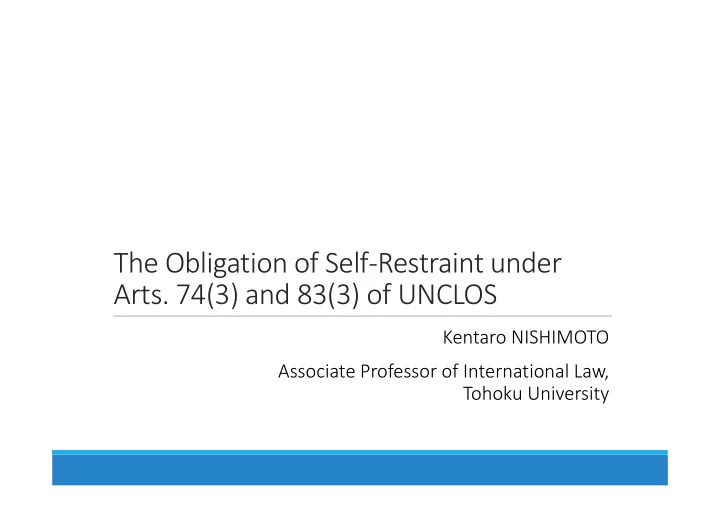

The Obligation of Self-Restraint under Arts. 74(3) and 83(3) of UNCLOS Kentaro NISHIMOTO Associate Professor of International Law, Tohoku University
Obligation to Exercise Self-Restraint UNCLOS provides that delimitation of the EEZ and the continental shelf (CS) “shall be effected by agreement” (Arts. 74(1) and 83(1)). Pending agreement, States are under a positive obligation to make every effort to enter into provisional arrangements and a negative obligation to make every effort not to jeopardize or hamper the reaching of the final agreement. 3. Pending agreement […] , the States concerned, in a spirit of understanding and cooperation, shall make every effort to enter into provisional arrangements of a practical nature and, during this transitional period, not to jeopardize or hamper the reaching of the final agreement. Such arrangements shall be without prejudice to the final delimitation. 2
Function of the Obligation of Self-Restraint The obligation of self-restraint functions to provide stability in a potentially difficult transitional period, by restraining unilateral actions which may aggravate maritime delimitation disputes. The obligation may be understood as linked to more broader obligations: ◦ Principle of good faith (Art. 300) ◦ Obligation to settle disputes by peaceful means and to refrain from the use or threat of force (UN Charter) ◦ Undertakings for preventing escalation of disputes that would affect peace and stability (cf. Declaration on the Conduct of Parties in the South China Sea) 3
“… not to jeopardize or hamper” The obligation of self-restraint does not prohibit all activities in the undelimited maritime area: only activities that jeopardize or hamper final agreement are prohibited. Activities conducted pursuant to provisional arrangements are permissible. Questions on the Scope of the Obligations: ◦ The material scope of the obligations: What types/categories of activities are considered to jeopardize or hamper final agreement? ◦ The geographical scope of the obligations: Are certain activities more or less “jeopardizing or hampering” depending on their location? 4
Material Scope of the Obligation Exploration/Exploitation of Continental Shelf Resources ◦ Aegean Sea Continental Shelf case (ICJ, Interim Measures, 1976) ◦ The ICJ declined to order interim measures to suspend seismic exploration because: (1) the activity did not risk physical damage to the CS, (2) the activity was of a transitory character and did not involve establishment of installations, (3) the activity did not involve actual appropriation or use of resources ◦ The ICJ did not directly rule on the legality of the activity, but the judgment seems to be based on the understanding that seismic exploration activities of a transitory character do not seriously affect the rights of the coastal State. 5
Material Scope of the Obligation (contd.) Exploration/Exploitation of Continental Shelf Resources ◦ Guyana v Suriname Arbitration Award (2007) ◦ The tribunal held that Guyana had violated the obligation by allowing its concession holder to undertake exploratory drilling in disputed waters. ◦ The Award made a distinction between activities that lead to a permanent physical change, such as exploitation of oil and gas reserves, and those that do not, such as seismic exploration. ◦ Ghana v Côte d'Ivoire (ITLOS, Provisional Measures, 2015) ◦ “acquisition and use of information about the resources of the disputed area would create a risk of irreversible prejudice” 6
Material Scope of the Obligation (contd.) Fishing Activities Different considerations may apply to renewable resources ◦ Fisheries Jurisdiction case (ICJ, Provisional Measures, 1972) ◦ The order allowed fishing activities to continue while ordering that the UK and Iceland should “ensure that no action of any kind is taken which might aggravate or extend the dispute”. Acts Against Unilateral Acts by the Other State ◦ Guyana v Suriname Arbitration Award (2007) ◦ The tribunal held that Suriname had violated the obligation by its use of threat of force against a oil rig licensed by Guyana in a disputed area. 7
Geographic Scope of the Obligation Are certain activities more or less “jeopardizing or hampering” depending on their location in the undelimited area? There seems to be little or no precedent/State practice. However, the two far ends of the area of overlapping 200M entitlements are usually unaffected by delimitation. It might be argued that the geographic scope of the obligation would depend on the plausibility that the relevant area would fall under the other side of the final delimitation line. The median/equidistance line might provide some guidance in light of jurisprudence on maritime delimitation. However, the plausibility criteria would prove difficult to put into practice since the delimitation dispute itself is a result of different perception of where the final line should be. 8
Context-Dependent Character of the Obligation Some types of activities have been identified as ‘jeopardizing or hampering’ in the jurisprudence of international courts and tribunals. However, the content of the obligation cannot be entirely separated from the specific context of a maritime delimitation dispute. Although more guidance on the scope of obligations would be helpful to States, a careful assessment of case-specific factors would likely be necessary in most cases. What is essential is for States to act in good faith, “in a spirit of understanding and cooperation” (Art. 74(3) and 83(3)) within the context of the maritime delimitation dispute. Although some questions remain on the precise scope of the obligation of self-restraint, this does not mean that the obligation of self-restraint rests on uncertain grounds. 9
Conclusions The obligation of self-restraint is important in providing stability in a undelimited area during a potentially difficult transitional period. The jurisprudence of international courts and tribunals sheds some light on the material scope of the obligation. Certain activities are by their nature considered to be contrary to the obligation of self-restraint when undertaken unilaterally. However, there remain some questions on the precise scope of the obligation. In many cases, the scope of the obligation need to be determined in light of case-specific factors. What is essential is for States to act in good faith, “in a spirit of understanding and cooperation” (Art. 74(3) and 83(3)) within the context of the maritime delimitation dispute. 10
Recommend
More recommend